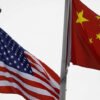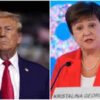SEOUL: South Korea’s Constitutional Court on Friday upheld President Yoon Suk Yeol’s impeachment over his disastrous martial law declaration, voting unanimously to strip him of office for violating the constitution.
Yoon Suk Yeol, 64, has been suspended by lawmakers following a controversial attempt on December 3 to undermine civilian governance, which included the deployment of armed soldiers to parliament. Additionally, he faces arrest on insurrection charges as part of an ongoing criminal investigation.
This suspension necessitates the organization of new presidential elections within the next 60 days.
“The respondent’s constitutional violations have resulted in serious negative repercussions and widespread implications,” stated acting court President Moon Hyung-bae as the court unanimously ruled to dismiss President Yoon. All eight judges involved have been provided with extra security by police amid rising tensions and protests from Yoon’s supporters.
The judges characterized Yoon’s actions as breaches of the fundamental principles of the rule of law and democratic governance, arguing that they jeopardized the constitutional framework and threatened the stability of the democratic republic.
By sending armed troops to parliament to block lawmakers from rescinding his decree, Yoon was found to be in violation of the political neutrality expected of the armed forces and the responsibilities associated with supreme command. The judges asserted that deploying military forces for political ends not only caused a confrontation between soldiers—who are sworn to ensure national security—and ordinary citizens, but also constituted a betrayal of public trust.
Ultimately, the court deemed Yoon’s unconstitutional and illegal actions as intolerable violations of the law and a serious affront to the Constitution, underscoring the need to uphold democratic ideals.
Yoon is the second South Korean leader to be impeached by the court after Park Geun-hye in 2017.
After weeks of tense hearings, judges spent more than a month deliberating the case, all while public unrest swelled.
Police raised the alert to the highest possible level Friday, enabling the deployment of their entire force. Officers encircled the courthouse with a ring of vehicles and stationed special operations teams in the vicinity.
Anti-Yoon protesters cried, cheered and screamed as the verdict was announced. Some jumped and shook each other’s hands in joy, while others hugged people and cried.
Outside Yoon’s residence, hissupporters shouted and swore, with some bursting into tears as the verdict was announced.
Yoon, who defended his attempt to subvert civilian rule as necessary to root out “anti-state forces”, still commands the backing of extreme supporters.
At least two staunch Yoon supporters — one in his 70s and the other in his 50s — have died after self-immolating in protest of the controversial leader’s impeachment.
Embassies — including the American, French, Russian and Chinese — have warned citizens to avoid mass gatherings in connection with Friday’s verdict.
The decision shows “first and foremost the resilience of South Korean democracy,” Byunghwan Son, professor at George Mason University, told AFP.
“The very fact that the system did not collapse suggests that the Korean democracy can survive even the worst challenge against it — a coup attempt.”
“HIGHLY UNLIKELY” TO REINSTATE
South Korea has spent the four months since Yoon declared martial law without an effective head of state, as the opposition impeached Yoon’s stand-in — only for him to be later reinstated by a court ruling.
The leadership vacuum came during a series of crises and headwinds, including an aviation disaster and the deadliest wildfires in the country’s history.
This week, South Korea was slammed with 25 percent tariffs on exports to key ally the United States after President Donald Trump unveiled global, so-called reciprocal levies.
Since December, South Korea has been “partially paralysed — it has been without a legitimate president and has been challenged by natural disasters and the political disaster called Trump,” Vladimir Tikhonov, Korean Studies professor at the University of Oslo, told AFP.
Yoon also faces a separate criminal trial on charges of insurrection over the martial law bid.



